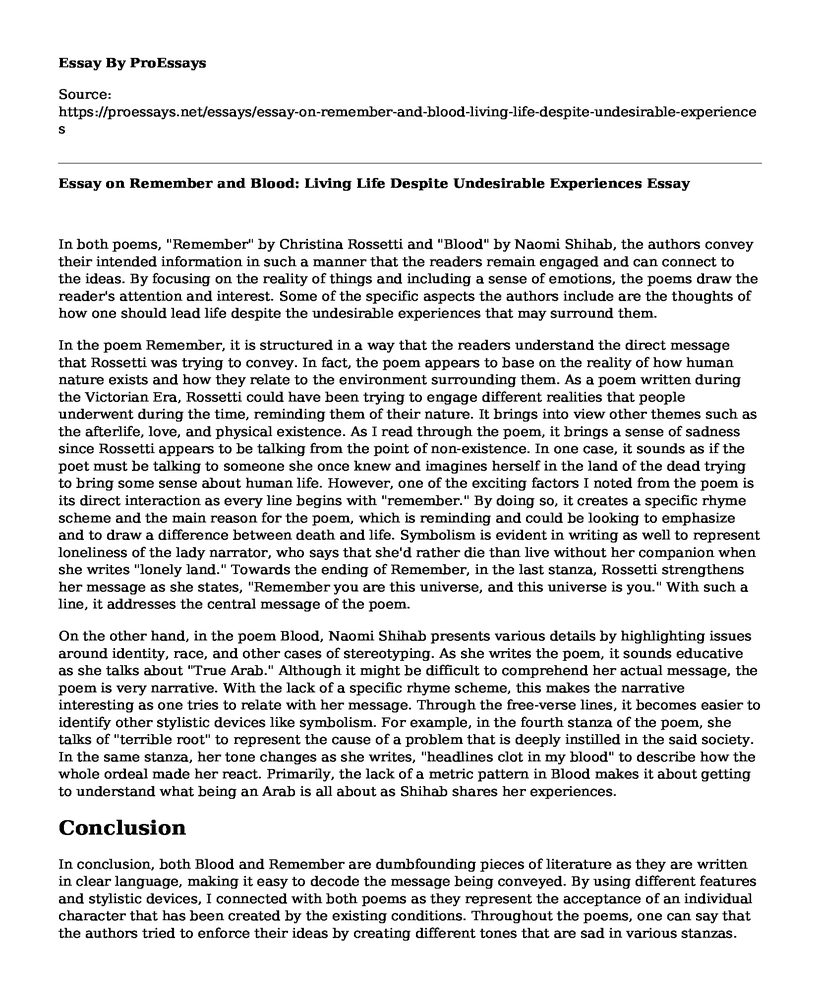In both poems, "Remember" by Christina Rossetti and "Blood" by Naomi Shihab, the authors convey their intended information in such a manner that the readers remain engaged and can connect to the ideas. By focusing on the reality of things and including a sense of emotions, the poems draw the reader's attention and interest. Some of the specific aspects the authors include are the thoughts of how one should lead life despite the undesirable experiences that may surround them.
In the poem Remember, it is structured in a way that the readers understand the direct message that Rossetti was trying to convey. In fact, the poem appears to base on the reality of how human nature exists and how they relate to the environment surrounding them. As a poem written during the Victorian Era, Rossetti could have been trying to engage different realities that people underwent during the time, reminding them of their nature. It brings into view other themes such as the afterlife, love, and physical existence. As I read through the poem, it brings a sense of sadness since Rossetti appears to be talking from the point of non-existence. In one case, it sounds as if the poet must be talking to someone she once knew and imagines herself in the land of the dead trying to bring some sense about human life. However, one of the exciting factors I noted from the poem is its direct interaction as every line begins with "remember." By doing so, it creates a specific rhyme scheme and the main reason for the poem, which is reminding and could be looking to emphasize and to draw a difference between death and life. Symbolism is evident in writing as well to represent loneliness of the lady narrator, who says that she'd rather die than live without her companion when she writes "lonely land." Towards the ending of Remember, in the last stanza, Rossetti strengthens her message as she states, "Remember you are this universe, and this universe is you." With such a line, it addresses the central message of the poem.
On the other hand, in the poem Blood, Naomi Shihab presents various details by highlighting issues around identity, race, and other cases of stereotyping. As she writes the poem, it sounds educative as she talks about "True Arab." Although it might be difficult to comprehend her actual message, the poem is very narrative. With the lack of a specific rhyme scheme, this makes the narrative interesting as one tries to relate with her message. Through the free-verse lines, it becomes easier to identify other stylistic devices like symbolism. For example, in the fourth stanza of the poem, she talks of "terrible root" to represent the cause of a problem that is deeply instilled in the said society. In the same stanza, her tone changes as she writes, "headlines clot in my blood" to describe how the whole ordeal made her react. Primarily, the lack of a metric pattern in Blood makes it about getting to understand what being an Arab is all about as Shihab shares her experiences.
Conclusion
In conclusion, both Blood and Remember are dumbfounding pieces of literature as they are written in clear language, making it easy to decode the message being conveyed. By using different features and stylistic devices, I connected with both poems as they represent the acceptance of an individual character that has been created by the existing conditions. Throughout the poems, one can say that the authors tried to enforce their ideas by creating different tones that are sad in various stanzas. Nonetheless, I feel that both poems shed perspective and advice on how we should carry ourselves in instances of death and when dealing with the identities of other people.
Cite this page
Essay on Remember and Blood: Living Life Despite Undesirable Experiences. (2023, May 30). Retrieved from https://proessays.net/essays/essay-on-remember-and-blood-living-life-despite-undesirable-experiences
If you are the original author of this essay and no longer wish to have it published on the ProEssays website, please click below to request its removal:
- The Canterbury Tales of General Prologue Analysis
- Race in To Kill a Mockingbird Essay Example
- Characters and the Society in the Great Gatsby and the Brave New World - Critical Essay
- The Theme of Isolation From the Poem the Taxi Essay Example
- Comparison Between "The Glass Menagerie" and "A Raisin in the Sun" Essay
- Literary Analysis Essay on Lord of the Flies
- Essay Sample on Love's Overpowering Beauty: Ligeia by Edgar Allan Poe







